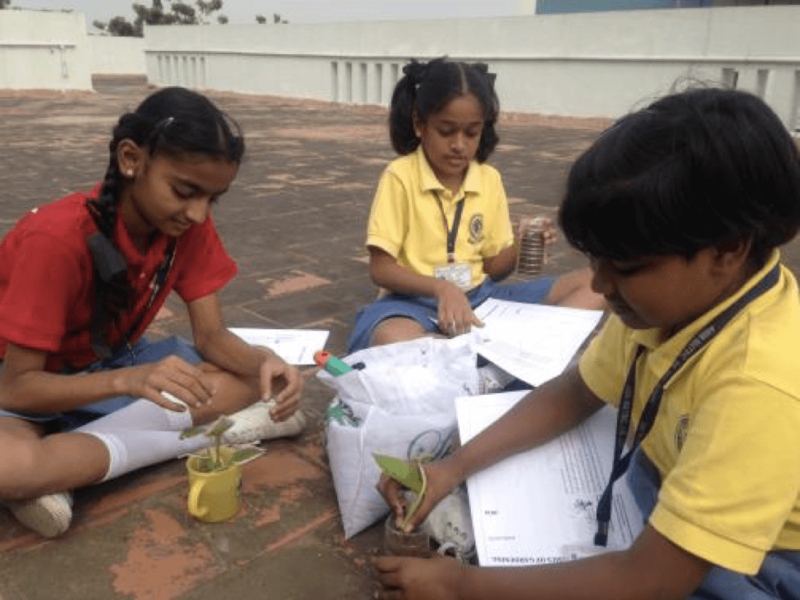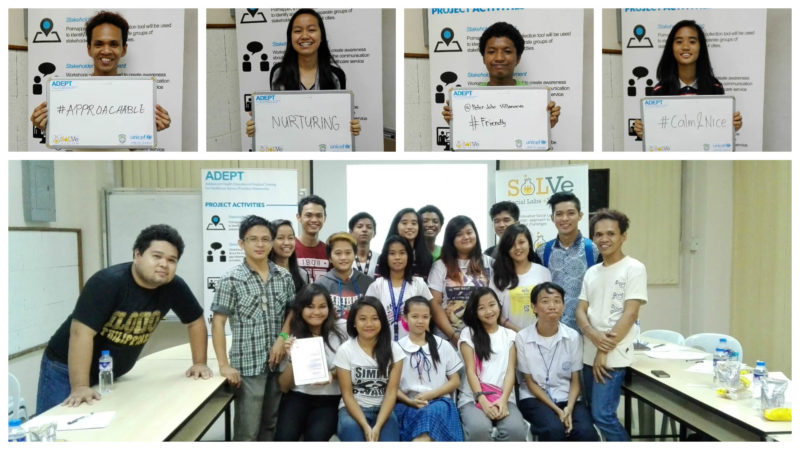Acute shortage of electricity is a major problem that India faces currently. About 71% of electricity is generated from non-renewable resources which results in death from indoor pollution and carbon monoxide burning. However, India simultaneously possesses a huge potential for solar power generation. However, developments in the field of solar energy are met with the challenge of finding people with expertise in the field.
Co-financed by DEG and Phocos, and implemented by ASSIST, ENACT aimed to set up a solar academy to develop skilled technicians from among women and youth of rural areas through a well-structured training program. The larger aim of the project was to take a step towards addressing the problem of acute shortage of electricity in India through renewable energy alternatives.
Over the course of two years, ENACT has created mass awareness among the public on the use of solar energy and its efficiency when compared to other energy sources through various mobilization and awareness campaigns. This project informed more than 800 students in the fields of IT, science and engineering on solar energy and technology. Moreover, ENACT trained 141 students, of which 45 were women, as solar technicians and more than 50 trainers. Dealership was given to several solar technicians who started their own enterprises.
Plastic bags create a significant environmental impact and lead to economic burdens. About 25 million tonnes of plastic were produced in 2010 alone and 90% of trash floating in the ocean consists of plastic, which is 46,000 pieces of plastic per square mile. Over 100,000 marine mammals and one million seabirds die each year due to plastic. Sri Lanka, being an island country, faces the serious concern of oceanic pollution.
One successful way to reduce the number of plastic bags in circulation is to replace them with biodegradable bags which offer a suitable alternative. REPLACE, co-financed by DEG and implemented by BASF Lanka and ASSIST, demonstrated the ease and benefits of switching to biodegradable materials for plastic production. The objective of this project was to encourage the use of compostable bags and effectively manage organic and biodegradable waste in Sri Lanka. The project aimed to do this by increasing awareness among government policy makers, major stakeholders and users on the environmentally harmful and damaging consequences of non-degradable plastic and the importance of waste segregation at the source.
As part of the project initiative, an awareness station was inaugurated on World Environment Day (June 5) in Good Market, Colombo to create awareness among the public about the need to switch to certified compostable plastic bags. University students / volunteers were engaged to facilitate the educational session and conduct surveys to collect feedback from the participants. Apart from Good Market, awareness stations were also set up at some of the prominent retail stores in Sri Lanka. Other activities included the conducting of road shows and seminars. These activities drew more than 15,000 participants from hotels, shopping malls, retailers and government agencies. Two producers / converters to biodegradable plastic bags were identified and were given trainings to produce the biodegradable bags while many more were encouraged to make the shift.
Sri Lanka generates an estimated 6,700 metric tons of waste daily – out of which only 2,800 is collected. The absence of an efficient system to clean up the waste has brought about a need to create a well-organized waste management system in Sri-Lanka to avoid the spread of toxic chemicals and pollution in the environment.
PROMISE is a private sector partnership (PSP) project between DEG and Holcim (Lanka) Geocycle Limited, in partnership with ASSIST, that aimed to provide an appropriate solution to the unorganised dumping and burning of waste in Sri Lanka. Thus, a waste management complex was set up at the Seeduwa dump site – which is surrounded by two key industrial zones called Katunayake and Biyagama, the country’s largest housing scheme called Raddolugama and the main airport in Sri Lanka (Katunayake Bandaranaike International Airport).
ASSIST undertook various interventions to ensure the sustainability and effectiveness of PROMISE. The waste management complex included a fully operational material receiving and segregating site. Training was facilitated for the surrounding communities, municipal / government offices, and urban councils. Green clubs promoting proper waste management and green bank facilities for collecting waste were set up in local schools and universities. Involving households and neighbourhoods in the establishment of a waste management ecosystem was essential to the project’s success.
i2Can – Inspiring and Igniting Young Minds is a series of experiential learning programs designed to provide in-school children with a combination of simple life skills and awaken in them the passion for green, clean and safe living. More specifically, the focus is on instilling the right values and skills on health, sanitation and hygiene, first-aid and emergency response, green living philosophy (reduce, reuse, recycle), ethics and morals and problem-solving and decision-making, which would enable the youth to become agents of change.
Through the above initiatives, i2Can aims to empower these young people to learn, practice, and thrive in their communities. They are also actively encouraged to share their knowledge with their immediate family and friends. The key beneficiaries of this programme are the urban poor and rural communities.
ASSIST undertook various activities during the implementation of this project that included teaching using live demonstrations, activity-based learning, workshops, seminars and lectures. By the end of 2017, i2Can had reached over 20,000 students and involved more than 450 schools in the southern state of Tamil Nadu, India.

School gardens serve as living laboratories where academic subjects can be integrated and the children can be active participants in the learning process.
In order to introduce children to such learning, 1,2,3 Grow was an initiative that promoted the creation of gardens at schools in the Indian state of Tamil Nadu. The main aim behind 1,2,3 Grow was for children to gain appreciation and respect for the environment that lasts into adulthood. The initiative also aimed to promote improved social skills amongst school children such as, working in groups and problem-solving; and to prepare them for higher education.
Gardens were built in private schools where children could practice their social skills and learn how to grow plants from which they get healthy food to eat. Workshops were also conducted as a supplementary activity to these pilot gardens.

Adolescence is a critical time when the youth are interested in important issues such as reproductive health. However, engaging with them has proved to be a challenge for healthcare workers. ADEPT aims to bridge this communication gap by providing healthcare service providers in four key cities in the Visayas with an e-learning toolkit that they can access at their convenience. The one-year initiative equips healthcare workers to provide the youth with information on reproductive services available for them thus, enabling them to make informed decisions about their health and welfare.
ASSIST developed a video-based e-learning toolkit for healthcare professionals in Borongan, Iloilo, Roxas, and Tacloban. The platforms provided them with relevant healthcare data gathered from the conduct of stakeholder mapping. ADEPT also became a platform for youth groups and adolescent health care providers to interact and access resources on reproductive healthcare.
In developing the toolkit, ASSIST conducted: (1) Stakeholder Mapping to engage groups of key stakeholders in the project sites; (2) Stakeholder Engagement wherein one-day workshops were conducted in each of the cities to build awareness on the importance of adequate communication between healthcare professionals and the youth; (3) e-Learning Tool Design, Production and Launch wherein the development of the toolkit was based on the inputs from stakeholder consultations; and (4) Training of Trainers (ToT) Workshops where healthcare service providers were equipped in the application of the toolkit in their engagement with the youth.
In a bid to extend financial inclusion to remote areas in the Philippines, the CAN program of the Grameen Foundation aims to build a network of financial agents in rural villages of Panay Island. The project enabled sari-sari store owners, mostly stay-at-home mothers, to offer a range of financial services to their villages.
ASSIST developed two interactive, web-based e-learning courses to equip sari-sari store owners to become a financial agent which can be accessed through Android-based tablets. Course One teaches the owners to use the digital payment center device called Ka-Pos!ble!; and Course Two is an engaging, easy-to-understand module on encouraging financial literacy among micro-vendors who used digital payment devices called Digi-tindahan. ASSIST designed and developed the storyboard, script, graphics, animations, and videos for both the following courses.
The Department of Health (DOH), with the support of the World Health Organization – Philippines Country Office (WHO-PHL), led the development of a Manual of Operations for the Adolescent Health and Development Program. The Manual serves as a guide for program managers, coordinators and implementers in operationalizing the National Policy and Strategic Framework on Adolescent Health and Development (AHDP).
To enable the Department of Health to develop an appropriate, effective and sustainable adolescent health and development program, a manual of operations has been developed and ready for print layouts. ASSIST was contracted to provide the layout and design services for this publication. Aside from leading the creative design, ASSIST also reviewed relevant photos and conducted photo shoots to provide the publication with useful visuals,\ and closely coordinated with different DOH units and stakeholders for technical inputs.
Over the past 20 years, Vietnam has developed into one of the major food processors and exporters in the global market. However, product safety and quality control has become a major concern to the Vietnamese authorities. With increasing awareness and consumers’ expectations of health and food hygiene issues, the low performance in meeting the requirements of food safety principles and standards are seen as major obstacles for further growth of the food industry, especially when it comes to exporting agricultural products.
This distinct private sector partnership (PSP) project organized by DEG, TÜV Rheinland and ASSIST, aimed to create a broad impact on Agro and Dairy food safety and hygiene awareness throughout Vietnam’s entire supply chain. Awareness campaigns, forums, trainings and certification programs were designed to build local capability. Dialogue sessions were conducted with the aim of reviewing the gaps and making changes to support small and medium enterprises in agro – dairy producing industries in adopting best international practices for safety and quality. e-learning kits and self-audit guides were also built to help the target industries strengthen their quality control activities and to sustain the project in the long term.
Targeting Vietnam’s agricultural and dairy supply chain, this DEG-supported project features awareness campaigns as well as training and certification programs – all of which were designed to build local capability and create a multiplier effect. Dialogue sessions with policymakers and representatives of different stakeholder groups were conducted to assess the gaps and propose changes to support the agro-dairy SMEs in adopting international safety and quality standards.



